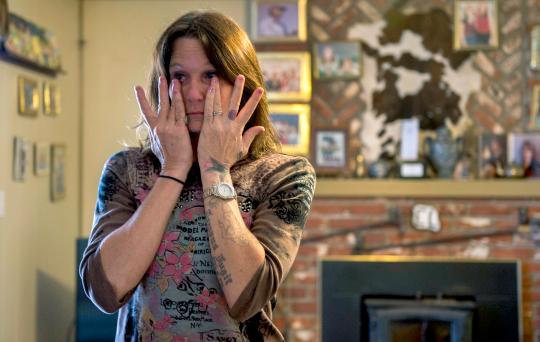Barbra Scrivner thought winning clemency was the hard part. Then she got out.
On a sunny day just a few months after she was released from federal prison, Barbra Scrivner drove three blocks from her ranch-style home on a quiet street in Fresno, Calif., to the Walgreens on the corner, tottering on her wedge heels as she got out of the car. After sending out her résumé to dozens of nearby businesses, she had finally landed a job interview, to be a sales associate at the store.
Scrivner clutched her résumé, but she also brought what she considered a secret weapon of sorts: a letter sent by President Barack Obama after he set her free last December. The single sheet was hand-signed — Scrivner moved her fingertips over the signature to check that it wasn’t a copy — and was full of encouragement from the president. She planned to show her interviewer at Walgreens the letter, so he would know she wasn’t just like any other ex-felon fresh out of prison.

Barbra Scrivner wipes away tears thinking of the years she couldn’t be there for her daughter Alannah while in prison. (Renée C. Byer/ZumaPress for Yahoo News)
But once the interview began, it moved so fast that Scrivner never felt like there was a good time to bring up the letter. The manager scanned her résumé quickly — and asked her what “DCI Dublin,” her former employer, was.
“I’ve never heard of that company,” he told her.
“Well, it’s because it’s a prison,” Scrivner answered nervously.
The manager assured her he wouldn’t judge her for that, that he’d give her a “fair shake,” just like any other applicant. Scrivner had heard that before, as employer after employer turned her down. Just a month earlier, she had been escorted from the premises of a call center company after her interviewer learned she was a felon. The Walgreens manager asked her how she had handled various customer service conundrums in the past, such as a dissatisfied, difficult customer. Scrivner paused to think about it and then said that when she worked in the prison kitchen and laundry, fellow inmates were often angry and rude to her, and she always managed to deescalate the situation.
When she left the interview, she felt panicked. She should have shown him Obama’s letter, but now it was too late. She opened it up and read it again in the parking lot.
No comments:
Post a Comment